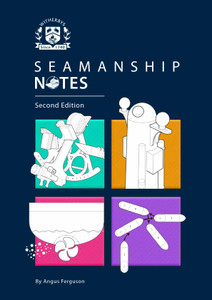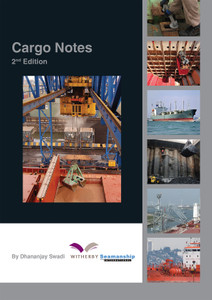
This is a concise guide to the relevant laws and regulations that a ship's Master is likely to encounter as they sail around the world. The book aims to explain the international application of maritime law, guiding Masters in their handling of shipping incidents in unfamiliar territory.
This
book
takes
examples
from
incidents
likely
to
be
encountered
by
any
ship,
of
any
registration
and
regardless
of
flag
or
administration.
It
details
a
wide
range
of
incidents,
including
terrorism
and
navigation
in
ice,
outlining
the
various
rules
and
regulations
that
should
underpin
Masters’
decision
making.
The
book
is
written
in
accessible
language
and
offers
clarification
on
maritime
law.
The
book
offers
insight
into
both
law
and
human
negotiation,
suggesting
there
is
space
for
both
in
the
maritime
context.
As we sail our ships around the world, we come into contact with various rules and regulations, some of which we are familiar with and others not, especially those applicable only to the country that the ship is visiting. However, maritime law is designed to be internationally applicable wherever a ship is and, in theory at least, is designed to deal with maritime incidents regardless of flag or administration.
How well do you know your rules? Do you find yourself embroiled in red tape?
Many problems arise because one side or another does not understand the applicable law for a given event. Worse still, reliance is often placed, by the shore authorities, on the Masters of ships not knowing the applicable law at the time when it is in their interest to do so.
There are a number of books dealing with all aspects of maritime law and business and ‘The Shipmaster’s Business Companion’ by Malcolm MacLachlan is an excellent book for those wishing to delve further into maritime law, particularly for British vessels. However, the aim of this book is to explain, in plain language, the laws for incidents and problems that a Master might encounter on an average vessel, of any registration, while going about normal business on the seas and in the ports.
It is important to remember that often, with an incident, unless it is obvious who or what is to blame, everyone believes that they are right. A problem can only be solved within the context of the law, together with reason and a willingness to listen. Always remember that calmness and courtesy go a long way toward resolution. As Master, your job is to resolve any matter in the best interests of your company, so you must at all times bear in mind that what you say and do will have an effect on the eventual outcome of any case.
In all incidents and events that may cause claims to be made against your vessel, your company or yourself, or in situations where you, on behalf of your company, might be making a claim against another party, maintenance of records is essential. These should be supported by photographs and witness statements. Often during an emergency, everyone is too fully occupied coping with the problems to write a log of events. However, if this is the case, as soon as possible after the event, the log must be written up while things are still fresh in everyone’s minds.
If you are going to take a deliberate action that could have legal consequences for your owners/operators or charterers, where possible you must consult with them before taking this action. This does not display doubt on your part, but is a sensible approach to the legal minefield of maritime law that we know little about. Your operator is better positioned to call upon specialist legal assistance if it is appropriate to do so.
It would be pleasant to say that, if the law supports your case, everything should be fine. Unfortunately, politics, both local and national, can come into play and cause various aspects of the law to be interpreted more freely than intended, or even put aside for the sake of expediency. There is a need in all of us for fair play or justice, but unfortunately justice is a concept that varies considerably in the various states that we visit. If the same legal thought that has gone into Charter parties had gone into the treatment of seafarers, many of our current problems would have been resolved. However, we must deal with what exists rather than what could or should be. Regrettably, in a few cases, payment of some kind or other may be the only solution. There is a time to wave the books of law around and there are times to sit down and negotiate. The art is knowing the time and place to do either of these.
At the time of writing, there have been several high profile cases which illustrate the legal difficulties faced by seafarers, with two pollution related incidents of particular concern. The first involves the Master and Chief Officer of the 'Hebei Spirit', whose initial acquittal and subsequent imprisonment after appeal by the prosecution, allegedly on the back of national public opinion, have been widely condemned throughout the industry. The evidence in the Korean Maritime Safety Tribunal Interim Report was described by INTERTANKO Managing Director Peter Swift as “nonsensical and flawed”, reflecting the opinions of a large proportion of the industry.
The second prominent case concerns the Master of the 'Prestige', who, after being arrested in a “knee-jerk reaction by a flailing government” (ITF seafarers’ Secretary Jon Whitlow), was consequently detained for 83 days. After appealing against this detainment, a unanimous decision by the Strasbourg court ruled that the €3m bail was not excessive and the period spent in a Spanish jail was short compared with comparable cases. The fact that the coastal State’s handling of the event contributed to making a manageable casualty into a major environmental incident does not appear to be considered significant.
Finally, an apology for all the laws and rules quoted. This is necessary if you are to have a reference to quote from when appropriate to the occasion. I have tried to deal only with the sections that have relevance to us as Masters as we sail around the world under a host of different flags, subject to their regulations and reliant on their support. The problem with maritime law is that its international nature makes it more complex than national law, and it is written by lawyers for lawyers rather than for seafarers. We need the Law of the Sea, but what we need now is for it to be followed by the States that agreed to it in the first place.
1 Who Owns the Seas?
2 Criminal Jurisdiction
3 The Flag State
4 Pollution
5 Stowaways
6 Port of Refuge
7 Charterers and Charter Party
8 Insurance
9 Ballast Water Management
10 Operating in Ice
11 Ocean Routeing
12 Refugees
13 Mutiny
14 The Fair Treatment of Seafarers (After a Maritime Accident)
15 Shore Leave and Seafarers’ Rights
16 Manning and Fatigue
17 Port State Control
18 The Law in Inland Waters
19 Conclusion
Michael Lloyd commanded a wide variety of ships during his career including passenger, heavy lift and oilfield support vessels in Nigeria. He served 35 years in the Royal Naval Reserve and for 10 years he represented shipmasters on the Council of Numast. He is a Fellow of the Nautical Institute and a Younger Brother of Trinity House.
- Number of Pages:
- 132
- ISBN:
- 9781905331406
- Published Date:
- February 2009
- Binding Format:
- Paperback
- Book Height:
- 230 mm
- Book Width:
- 150 mm
- Weight:
- 0.4 kg
- Author:
Michael Lloyd
- Preview:
- Yes






